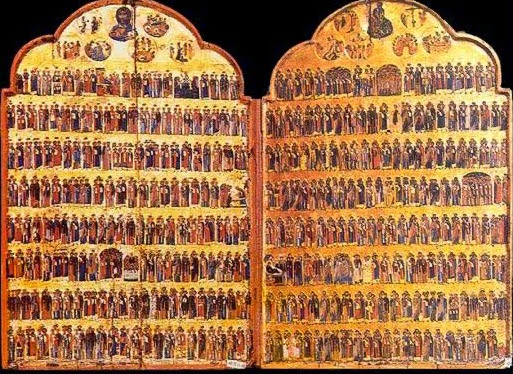A Hagiologion (calendar of all the saints by feast day) from St. Catherine's Monastery on Mount Sinai (13th century)
"Resplendent with the brightness of beauty, and shining as unerring stars, you have made the Church of Christ a star-filled heaven on earth by the diversity of your lives."--Canon of the Sunday of All Saints, Ode 3
The many mansions in the Father's house welcome countless men and women from every land and tongue, every tribe and nation, every race and people. Until we, God willing, are also there, we can never know the sheer number of those who have fallen asleep marked with the sign of faith, the multitude of those who are praising the Lord for eternity. For though there are thousands and thousands of the Lord's servants that we know are in Heaven, there are innumerably more as well whom we shall not know in this life.
These saints in Heaven, even the ones we do not glorify with that title, come from countless backgrounds. Some are men who lived on a pillar in the desert for the entirety of their lives; some are women who gave birth to over a dozen children and lived in an inner city. Some are celibate, some are married; some are quiet and reserved, some are fiery and abrasive. "The saints are like a group of trees, each bearing different fruit, but watered from the same source. The practices of one saint differ from those of another, but it is the same Spirit that works in all of them" (Abba John the Dwarf). Yet their variety goes beyond just this: after all, Christ told the Pharisees that prostitutes and publicans were entering the Kingdom of Heaven before them, and are we to disbelieve His Words? Thus sinners of a million colors now reside, purified, with the Lord. Maybe even those like Gilles de Rais have been forgiven and clothed with glory. He began as a companion of St. Joan of Arc, but when she was captured, he became a wretched man, committing unspeakable crimes, particularly to children. He and his accomplices were arrested and brought before a court, and he experienced a profound conversion, so profound that the Church accepted him back into her bosom after his confession. Yet the state decreed that his crimes were too great, and so he was sentenced to death: yet he asked to be executed at the same time as his accomplices, in order that he might try to convert them on the scaffold. Could not a man of such unspeakable horror be a saint through his conversion? Even those whose conversions we do not see can be welcomed there after purification.
Another categorization not often brought to mind are the innumerable earthly non-Catholics residing there. Of course, those in Heaven are all Catholics, part of the one Church, for there is only one Church. However, they may not have been Catholic on earth: indeed, they may not have even been Christian on earth. Yet God is the heart-knower, and He knows the faith of each and will reward them accordingly. So even those who are not Catholic on earth "are indeed in some real way joined to us in the Holy Spirit for, by His gifts and graces, His sanctifying power is also active in them"; and even those who are not Christian "may achieve eternal salvation" (Vatican II, Lumen Gentium §§15-16). I remember hearing a tale once about a member of the Vatican's Congregation for the Causes of Saints. Someone once asked him why the Church had never canonized a non-Catholic, and his response was, "No one has ever asked." For the Church cannot declare that all those outside the Catholic Church on earth are damned: that would be a limitation of the mercy of God. He can grant mercy to whomever He wishes, and He can see the true faith of each, so He alone can rightly judge the reward of each. Thus a Lutheran like Dietrich Bonhoeffer or a Methodist like John Wesley could be a saint (indeed, it is quite likely that those regarded as saints by other Christians, particularly the Orthodox, are truly such), as could a Hindu like Mahatma Gandhi or a Jew like Mosheh ben Maimon (Maimonides). Even one with no explicit knowledge of and faith in God can be saved.
Of course, none of this denies the that Christ is the Way, the Truth, and the Life. It is still only through faith in Him that all receive eternal life. It is still only through Baptism, whether of water or of blood or of mere desire, that men are illuminated and divinized. Though we must not presume on the salvation of those outside the Church on earth, we should not despair of their automatic damnation; it is the same with those who are manifest sinners on earth. Instead of condemning our brothers, let us "Hold every brother as a saint," for so each may be (St. Nil Sorsky). God's mercy works in a myriad of ways. Let us follow the dictate of St. Antony the Great: "So do you also be earnest always to be in union first with the Lord and then with the Saints, that after death, they also may receive you into everlasting tabernacles as known friends." Let us ask that all the saints, including the countless ones we will be surprised by if, God willing, we join them, pray for us and for all, that the Church Triumphant in Heaven may grow ever larger and fuller, that the hymns of the eternal liturgy may be sung ever louder, and that the mansions of the Father's house grow ever more populated. All you saints, known and unknown, pray for us!
All Saints' Day (1813) by V.I. Khokhlov
Text ©2014 Brandon P. Otto. Licensed via CC BY-NC. Feel free to redistribute non-commercially, as long as credit is given to the author.

No comments:
Post a Comment